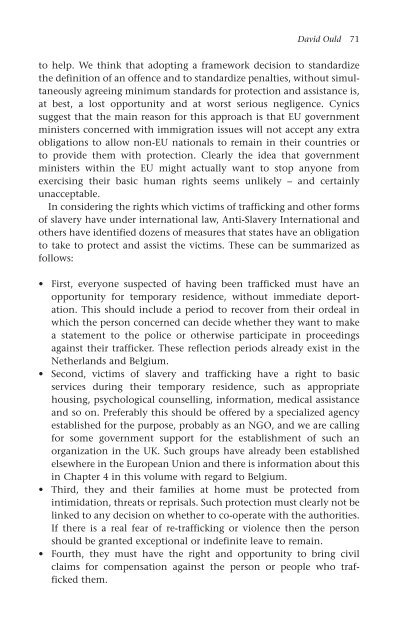3071-The political economy of new slavery
3071-The political economy of new slavery
3071-The political economy of new slavery
Create successful ePaper yourself
Turn your PDF publications into a flip-book with our unique Google optimized e-Paper software.
David Ould 71<br />
to help. We think that adopting a framework decision to standardize<br />
the definition <strong>of</strong> an <strong>of</strong>fence and to standardize penalties, without simultaneously<br />
agreeing minimum standards for protection and assistance is,<br />
at best, a lost opportunity and at worst serious negligence. Cynics<br />
suggest that the main reason for this approach is that EU government<br />
ministers concerned with immigration issues will not accept any extra<br />
obligations to allow non-EU nationals to remain in their countries or<br />
to provide them with protection. Clearly the idea that government<br />
ministers within the EU might actually want to stop anyone from<br />
exercising their basic human rights seems unlikely – and certainly<br />
unacceptable.<br />
In considering the rights which victims <strong>of</strong> trafficking and other forms<br />
<strong>of</strong> <strong>slavery</strong> have under international law, Anti-Slavery International and<br />
others have identified dozens <strong>of</strong> measures that states have an obligation<br />
to take to protect and assist the victims. <strong>The</strong>se can be summarized as<br />
follows:<br />
• First, everyone suspected <strong>of</strong> having been trafficked must have an<br />
opportunity for temporary residence, without immediate deportation.<br />
This should include a period to recover from their ordeal in<br />
which the person concerned can decide whether they want to make<br />
a statement to the police or otherwise participate in proceedings<br />
against their trafficker. <strong>The</strong>se reflection periods already exist in the<br />
Netherlands and Belgium.<br />
• Second, victims <strong>of</strong> <strong>slavery</strong> and trafficking have a right to basic<br />
services during their temporary residence, such as appropriate<br />
housing, psychological counselling, information, medical assistance<br />
and so on. Preferably this should be <strong>of</strong>fered by a specialized agency<br />
established for the purpose, probably as an NGO, and we are calling<br />
for some government support for the establishment <strong>of</strong> such an<br />
organization in the UK. Such groups have already been established<br />
elsewhere in the European Union and there is information about this<br />
in Chapter 4 in this volume with regard to Belgium.<br />
• Third, they and their families at home must be protected from<br />
intimidation, threats or reprisals. Such protection must clearly not be<br />
linked to any decision on whether to co-operate with the authorities.<br />
If there is a real fear <strong>of</strong> re-trafficking or violence then the person<br />
should be granted exceptional or indefinite leave to remain.<br />
• Fourth, they must have the right and opportunity to bring civil<br />
claims for compensation against the person or people who trafficked<br />
them.


